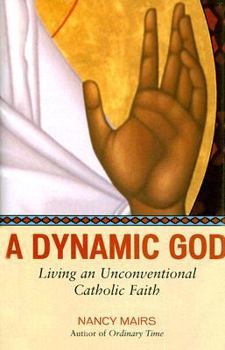A Dynamic God: Living an Unconventional Catholic Faith
Select Format
Select Condition 
Book Overview
When Nancy Mairs published her spiritual autobiography Ordinary Time, Kathleen Norris greeted it in the New York Times Book Review as "a remarkable accomplishment," calling Mairs "a relentlessly... This description may be from another edition of this product.
Format:Hardcover
Language:English
ISBN:0807077321
ISBN13:9780807077320
Release Date:September 2007
Publisher:Beacon Press (MA)
Length:142 Pages
Weight:0.75 lbs.
Dimensions:0.7" x 6.2" x 8.7"
Customer Reviews
1 rating
Rich, risky, startling
Published by Thriftbooks.com User , 17 years ago
The ten remarkable essays of A Dynamic God continue the interior journey Nancy Mairs began in her spiritual memoir, Ordinary Time: Cycles in Marriage, Faith, and Renewal (1993). In that book, Mairs introduced us to her understanding of belief, faith, conversion, and social conscience, maturing within the context of family history (both she and her husband were conventional Protestants) and continuing medical catastrophes. (She has multiple sclerosis; her husband George has had multiple melanomas.) This one-disaster-after-another life, which might have led a less hardy soul to despair, has graced Mairs with both wisdom and a wise uncertainty. "I now know that I now know less about God than I did to being with," she says in A Dynamic God. "I have discarded as many fixed ideas as possible about the God I inherited, and I'm unlearning more every day." This "deconstructive process"--trading conventional notions of God for radical understandings of the Sacred--is traced in a variety of ways throughour the essays. In "Left at the Altar," about communion and community, she reminds us that the central purpose of the Eucharist is to take God in "in preparation for living God out," and that absent the outreach to others, communion has little significance. In "A Calling," she wonders what her life purpose can be, bound to a wheelchair: "My doing days are done," she says. "Wanting some task carried out, God can do better than look to me." But being has a purpose that far transcends mere doing. We have to help God be God, she says, echoing Etty Hillesum, in An Interrupted Life. I am who God is. God is who I am. It is a theological, moral, and ethical statement of profound significance, and it colors all of Mairs' beliefs and actions. Many parts of this book will be uncomfortable for conventional Christians. Rejecting belief in a personal salvation gained by taking Christ as a personal savior (she doesn't believe in hell, either, or the virgin birth or the resurrection--literally, at least), she insists that we are not in this world for the purpose of being personally "saved." We are here to be God, to love others as ourselves: "If we take care of one another, we are saved." Her profound faith in a God that is the Whole of It expresses itself in her moral and ethical life: the choice that she and her husband have made to live modestly and simply, their protests against war, their visits to the sick and imprisoned and gifts to the poor--acts of charity described with a refreshing humility. "Believing as I do . . . that our every atom bears God into being, I cannot experience myself as truly apart," she writes. "Between you and me there is no Between." But while Mairs' doing days may be done, she is still writing, and it is her wry, witty candor and fierce, unflinching honesty that draws me to her work, over and over again. As an agnostic, I find her radical doubt energizing and inspiring. I am moved by the unconventional questions she asks and by her embrace





